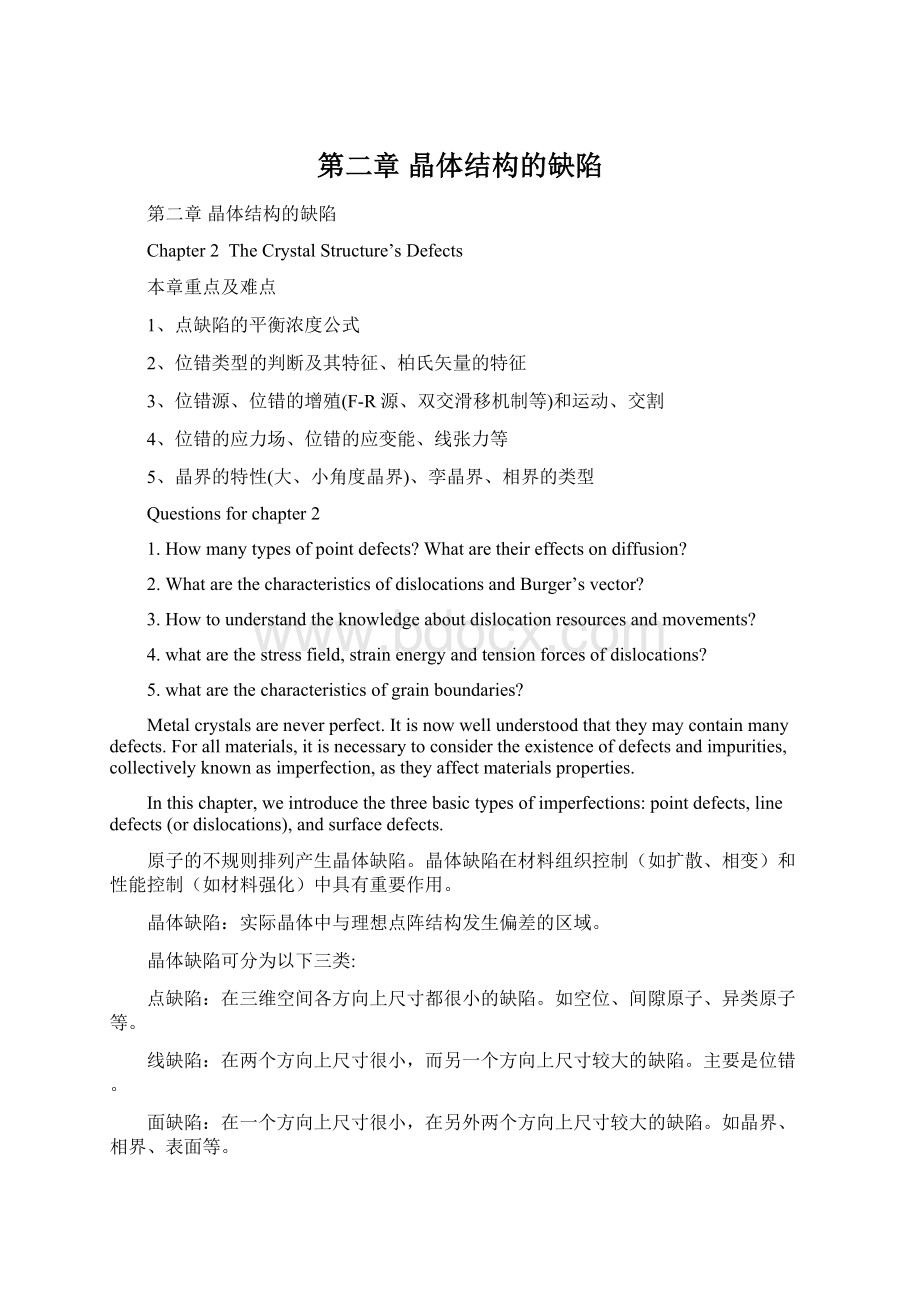第二章 晶体结构的缺陷.docx
《第二章 晶体结构的缺陷.docx》由会员分享,可在线阅读,更多相关《第二章 晶体结构的缺陷.docx(20页珍藏版)》请在冰豆网上搜索。

第二章晶体结构的缺陷
第二章晶体结构的缺陷
Chapter2TheCrystalStructure’sDefects
本章重点及难点
1、点缺陷的平衡浓度公式
2、位错类型的判断及其特征、柏氏矢量的特征
3、位错源、位错的增殖(F-R源、双交滑移机制等)和运动、交割
4、位错的应力场、位错的应变能、线张力等
5、晶界的特性(大、小角度晶界)、孪晶界、相界的类型
Questionsforchapter2
1.Howmanytypesofpointdefects?
Whataretheireffectsondiffusion?
2.WhatarethecharacteristicsofdislocationsandBurger’svector?
3.Howtounderstandtheknowledgeaboutdislocationresourcesandmovements?
4.whatarethestressfield,strainenergyandtensionforcesofdislocations?
5.whatarethecharacteristicsofgrainboundaries?
Metalcrystalsareneverperfect.Itisnowwellunderstoodthattheymaycontainmanydefects.Forallmaterials,itisnecessarytoconsidertheexistenceofdefectsandimpurities,collectivelyknownasimperfection,astheyaffectmaterialsproperties.
Inthischapter,weintroducethethreebasictypesofimperfections:
pointdefects,linedefects(ordislocations),andsurfacedefects.
原子的不规则排列产生晶体缺陷。
晶体缺陷在材料组织控制(如扩散、相变)和性能控制(如材料强化)中具有重要作用。
晶体缺陷:
实际晶体中与理想点阵结构发生偏差的区域。
晶体缺陷可分为以下三类:
点缺陷:
在三维空间各方向上尺寸都很小的缺陷。
如空位、间隙原子、异类原子等。
线缺陷:
在两个方向上尺寸很小,而另一个方向上尺寸较大的缺陷。
主要是位错。
面缺陷:
在一个方向上尺寸很小,在另外两个方向上尺寸较大的缺陷。
如晶界、相界、表面等。
2-1点缺陷
Section2.1PointDefects
1点缺陷的类型thetypesofpointdefects
A.空位:
VACANCIES
Theseareclassifiedaccordingtoafewimportanttypes.Oneofthemostimportantiscalledavacancy.Theexistenceofvacanciesincrystalswasoriginallypostulatedtoexplainsolid-statediffusionincrystals.
肖脱基空位(aSchottkydefect)-离位原子进入其它空位或迁移至晶界或表面。
弗兰克尔空位(aFrenkeldefect)-离位原子进入晶体间隙。
A.间隙原子:
INTERSTITIALATOMS
Aninterstitialdefectisformedwhenanextraatomorionisinsertedintothecrystalstructureatanormallyunoccupiedposition.Interstitialatomsorions,althoughmuchsmallerthantheatomsorionslocatedatthelatticepoints,arestilllargerthantheinterstitialsitesthattheyoccupy,consequently,thesurroundingcrystalregioniscompressedanddistorted.
位于晶体点阵间隙的原子。
B.置换原子:
SUBSTITUTIONALATOMS
Asubstitutionaldefectisintroducedwhenoneatomsorionisreplacedbyadifferenttypeofatomsorion.Thesubstitutionalatomsorionsmayeitherbelargerthanthenormalatomsorionsinthecrystalstructure,inwhichcasethesurroundinginter-atomicspacingsarereduced,orsmallercausingthesurroundingatomstohavelargerinter-atomicspacings.Ineithercase,thesubstitutionaldefectsdisturbthesurroundingcrystal.
位于晶体点阵位置的异类原子。
2点缺陷的平衡浓度
(1)点缺陷是热力学平衡的缺陷-在一定温度下,晶体中总是存在着一定数量的点缺陷(空位),这时体系的能量最低-具有平衡点缺陷的晶体比理想晶体在热力学上更为稳定。
(原因:
晶体中形成点缺陷时,体系内能的增加将使自由能升高,但体系熵值也增加了,这一因素又使自由能降低。
其结果是在G-n曲线上出现了最低值,对应的n值即为平衡空位数。
)
(2)点缺陷的平衡浓度
C=Aexp(-∆Ev/kT)
3点缺陷的产生及其运动
(1)点缺陷的产生
平衡点缺陷:
热振动中的能力起伏。
过饱和点缺陷:
外来作用,如高温淬火、辐照、冷加工等。
(2)点缺陷的运动
(迁移、复合-浓度降低;聚集-浓度升高-塌陷)
Fig2.1Threestepsinmotionsofavacancythroughacrystal
Diffusionincrystalsisexplained,intermsofvacancies,byassumingthatthevacanciesmovethroughthelattice,therebyproducingrandomshiftsoftheatomsfromonelatticepositiontoanother.ThebasicprincipleofvacancydiffusionisillustratedinFig.2.1,wherethreesuccessivestepsinthemovementofavacancyareshown.
Itcanbeseenthatthevacancymovesasaresultofanatomjumpingintoaholefromalatticepositionborderingthehole.Inordertomakethejump,theatommustovercomethenetattractiveforceofitsneighborsonthesideoppositethehole.Workisthereforerequiredtomakethejumpintothehole,or,asitmayalsobestated,anenergybarriermustbeovercome.Energysufficienttoovercomethebarrierisfurnishedbythethermalorheatvibrationsofthecrystallattice.Thehigherthetemperature,themoreintensethethermalvibrations,andthemorefrequentlyaretheenergybarriersovercome.Vacancymotionathightemperaturesisveryrapidand,asaconsequence,therateofdiffusionincreasesrapidlywithincreasingtemperature.
4点缺陷与材料行为
(1)结构变化:
晶格畸变(如空位引起晶格收缩,间隙原子引起晶格膨胀,置换原子可引起收缩或膨胀。
)
(2)性能变化:
物理性能(如电阻率增大,密度减小。
)
力学性能(屈服强度提高。
)
2-2线缺陷-位错
Sec.2.2LinearDefects:
IntroductiontoDislocations
Animportantcategoryofdefectsisthelinedefect,definedasaone-dimensional(linear)regioninthelatticecharacterizedbylocalfaultsintheatomicarrangement.Oneimportantconsequenceoftheinevitablepresenceofsuchdefects,usuallycalleddislocations,isthattheyenableatomstoslipandslidepastoneanotherunderappliedforcesthataremuchlowerthanwouldotherwisebepredicted.
位错:
晶体中某处一列或若干列原子有规律的错排。
意义:
(对材料的力学行为如塑性变形、强度、断裂等起着决定性的作用,对材料的扩散、相变过程有较大影响。
)
位错的提出:
1926年,弗兰克尔发现理论晶体模型刚性切变强度与与实测临界切应力的巨大差异(2~4个数量级)。
1934年,泰勒、波朗依、奥罗万几乎同时提出位错的概念。
1939年,柏格斯提出用柏氏矢量表征位错。
1947年,柯垂耳提出溶质原子与位错的交互作用。
1950年,弗兰克和瑞德同时提出位错增殖机制。
之后,用TEM直接观察到了晶体中的位错。
1位错的基本类型
1.1刃型位错edgedislocations
模型:
滑移面/半原子面/位错线(位错线┻晶体滑移方向,位错线┻位错运动方向,晶体滑移方向//位错运动方向。
)
分类:
正刃型位错(┻);负刃型位错(┳)。
Fig.2.2Anedgedislocation
Fig.2.2Arepresentsasimplecubiccrystalthatisassumedtobesubjectedtoshearingstresses,τ,onitsupperandlowersurfaces,asindicatedinthediagram.ThelineSPrepresentsapossibleslipplaneinthecrystal.Supposethatasaresultoftheappliedshearstress,theright-handhalfofthecrystalisdisplacedalongSPsothatthepartabovetheslipplaneismovedtotheleftwithrespecttothepartbelowtheslipplane.Theamountofthisshearisassumedtoequaloneinteratomicspacinginadirectionparalleltotheslipplane.TheresultofsuchashearisshowninFig.2.2B.Asmaybeseeninthefigure,thiswillleaveanextraverticalhalf-planecdbelowtheslipplaneattherightandoutsidethecrystal.Itwillalsoformanextraverticalhalf-planeababovetheslipplaneandinthecenterofthecrystal.Allotherverticalplanesarerealignedsothattheyruncontinuouslythroughthecrystal.
AnexaminationofFig2.2Bclearlyshowsthatthecrystalisbadlydistortedwherethishalf-planeterminatesattheslipplane.Itcanalsobededucedthatthisdistortiondecreasesinintensityasonemovesawayfromtheedgeofthishalf-plane.Thisisbecauseatlargedistancesfromthisloweredgeoftheextraplane,theatomstendtobearrangedastheywouldbeinaperfectcrystal.Thedistortioninthecrystalisthuscenteredaroundtheedgeoftheextraplane.Thisboundaryoftheadditionalplaneiscalledanedgedislocation.Itrepresentsoneofthetwobasicorientationsthatadislocationmaytake.Theotheriscalledascrewdislocationandwillbedescribedshortly.
1.2螺型位错screwdislocations
模型:
滑移面/位错线。
(位错线//晶体滑移方向,位错线┻位错运动方向,晶体滑移方向┻位错运动方向。
)
分类:
左螺型位错;右螺型位错。
1.3混合位错mixeddislocations
模型:
滑移面/位错线
Fig.2.3Atwo-componentdislocationcomposedofanedgeandscrewcomponent
2位错的性质characteristicsofdislocations
(1)形状:
不一定是直线,位错及其畸变区是一条管道。
(2)是已滑移区和未滑移区的边界。
(3)不能中断于晶体内部。
可在表面露头,或终止于晶界和相界,或与其它位错相交,或自行封闭成环。
(a)(b)
Fig.2.4athree-dimensionalsketchoftheedgedislocation
Fig.2.4arepresentsathree-dimensionalsketchoftheedgedislocationofFig.2.2.Thefigureclearlyshowsthatthedislocationhasthedimensionsofaline,inagreementwithourdiscussionofFig.2.2.AnotherimportantfactshowninFig.2.4bisthatthedislocationlinemarkstheboundarybetweentheshearedandunshearedpartsoftheslipplane.Thisisabasiccharacteristicofadislocation.Infact,adislocationmaybedefinedasalinethatformsaboundaryonaslipplanebetweenaregionthathasslippedandonethathasnot.
3柏氏矢量THEBURGERSVECTOR
Fig.2.5Acloseddislocationloop
TheareainsidetherectangleabcdofFig.2.5isshearedbyoneatomicdistance,thatis,insidethisregionthelatticelyingabovetheslipplane(ABCD)hasslippedoneatomicdistancetotheleftrelativetothelatticebelowtheslipplane.Thedirectionofthisshearisindicatedbythevector
thelengthofwhichisoneatomicdistance.OutsideofthedislocationloopshowninFig.2.6,thecrystalisnotsheared.Thedislocationis,therefore,adiscontinuityatwhichthelatticeshiftsfromtheunshearedtotheshearedstate.AlthoughthedislocationvariesinorientationintheslipplaneABCD,thevariationinshearacrossthedislocationiseverywherethesame,andtheslipvector
isthereforeacharacteristicpropertyofthedislocation.Bydefinition,thisvectoriscalledtheBurgersvectorofthedislocation.
(1)确定方法(避开严重畸变区)
a在位错周围沿着点阵结点形成封闭回路。
b在理想晶体中按同样顺序作同样大小的回路。
c在理想晶体中从终点到起点的矢量即为伯氏矢量。
(2)柏氏矢量的物理意义
a代表位错,并表示其特征(强度、畸变量)。
b表示晶体滑移的方向和大小。
c柏氏矢量的守恒性(唯一性):
一条位错线具有唯一的柏氏矢量。
d判断位错的类型。
(3)柏氏矢量的表示方法
a表示:
b=a/n[uvw](可以用矢量加法进行运算)。
b求模:
/b/=a/n[u2+v2+w2]1/2。
ThisprocedurecanbeusedtofindtheBurgersvectorsofanydislocationifthefollowingrulesareobserved:
(1)Thecircuitistraversedinthesamemannerasarotatingright-handscrewadvancinginthepositivedirectionofthedislocation.
(2)Thecircuitmustcloseinaperfectcrystalandmustgocompletelyaroundthedislocationintherealcrystal.
(3)Thevectorthatclosesthecircuitintheimperfectcrystal(byconnectingtheendpointtothestartingpoint)istheBurgersvector.
1.Edgedislocations:
(a)AnedgedislocationliesperpendiculartoitsBurgersvector.
(b)Anedgedislocationmoves(initsslipplane)inthedirectionoftheBurgersvector(slipdirection).Underashear-stresssense
apositivedislocation⊥movestotheright,anegativeone┬totheleft.
2.Screwdislocations:
(a)AscrewdislocationliesparalleltoitsBurgersvector.
(b)Ascrewdislocationmoves(intheslipplane)inadirectionperpendiculartotheBurgersvector(slipdirection).
4位错密度Thedislocationdensity
(1)表示方法:
ρ=K/V
ρ=n/A
(2)晶体强度与位错密度的关系(τ-ρ图)。
(3)位错观察:
浸蚀法、电境法。
Eveninadeformedsinglecrystal,onlyasmallfractionofthedislocationsformedduringdeformationcometothesurfaceandarel